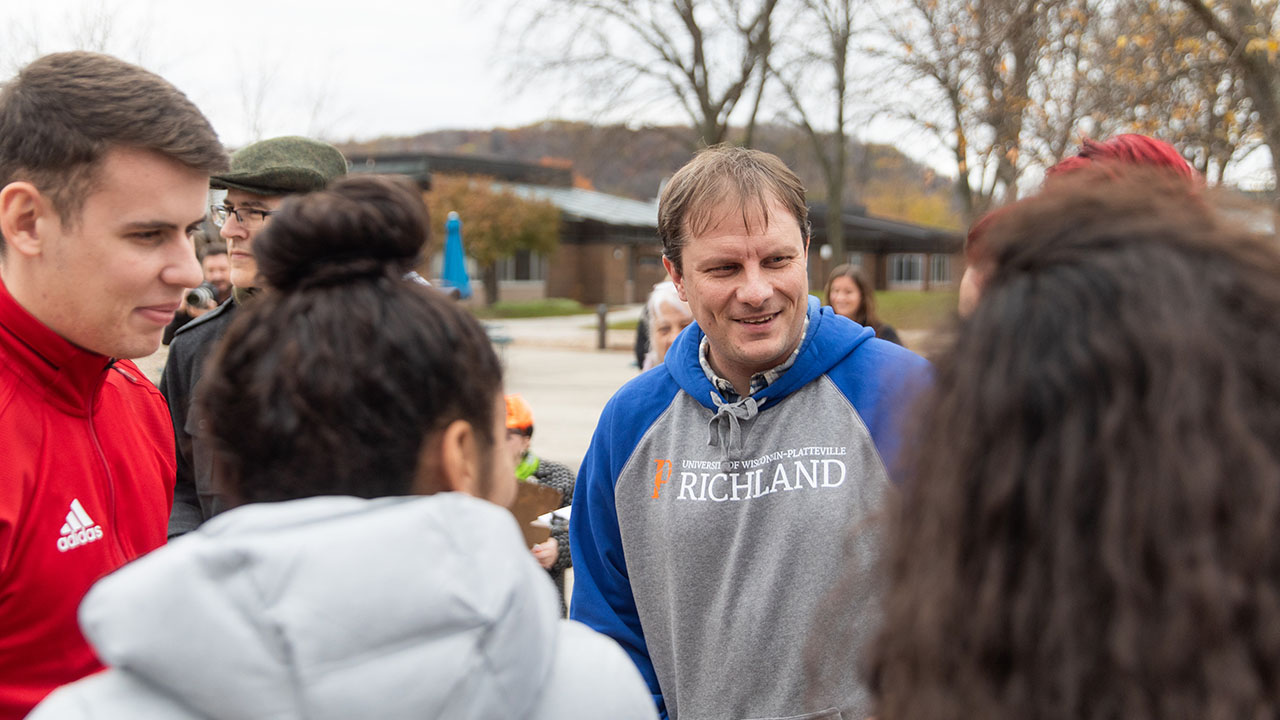
Dr. Brandon Fetterly started college at the UW-Marinette, eventually graduating from St. Norbert College and earning his Ph.D. from Iowa State University. He joined the faculty in the Chemistry department at UW-Richland in 2005, served as associate dean from 2012-15, and then as a regional associate dean for Academic Affairs in the UW Colleges starting in 2018. With the integration of UW-Richland into the UW-Platteville, he was named interim dean of the UW-Platteville Richland branch campus.
As dean, he leads the operation of the Richland campus, from academics and student affairs, budget and administration, and management of facilities and other operations; to external relations with alumni, the campus’ Foundation, local government, and other stakeholders.
Could you talk about the history of the Richland campus, which goes back more than 50 years?
It really goes back even further – the first public college in Richland County was founded in 1903. That had become a county teacher’s college by the 1960s, and as those were winding down in Wisconsin, Marge Wallace, who had been head of that, did the legwork needed to get a federal subsidy to help Richland County build this campus that opened in 1967. By 1974 she was dean, the first woman to officially lead a campus of the University of Wisconsin.
Initially, we were a branch of the Wisconsin State University at Platteville, and when the System was organized in 1973 the campus became part of what eventually was the UW Colleges. As with all 13 of the small campuses, the Richland land and buildings are still owned by the local government, and are leased to the university. The county pays for capital improvements and major maintenance.
There’s a tremendous, long legacy, and strong sense of community pride here for the campus, and what it means to people to have it here.
What do you think makes the branch campus experience at Richland special for students?
When I came to the campus to interview years ago, it reminded me of the education I had, and how much I would be able to impact others by teaching here, at a small school where there’s a chance to build connections that are deep and lasting. I still talk with students from prior classes whom I care about, and who care about this place. It’s not transactional, it’s relational – we’re all working together on your education, and getting you what you need to be successful.
Now that we’ve joined with UW-Platteville, I think that’s going to run even deeper. There are departments and courses our campus never had access to – like Food and Agriculture, for example. Right here at Richland, you can start into one of the very best agriculture programs in the System now, and you won’t even have to transfer – it’s just a transition to Platteville as your main campus as you advance. Same with the new Pre-Engineering program that is starting up this Fall.
But we have long been, and remain, focused on serving students who wants to pursue a degree in lots of other fields – healthcare, pre-law, liberal arts or anything else – and who then want to move on to UW-Madison, or UW-La Crosse, or another institution to finish. Sometimes I think our size can be both our greatest asset and our greatest disadvantage – in a class of 25, you’re not going to get overlooked. But you’re not going to be able to disappear, either. We’re paying attention. It’s a privilege that we can be a starting point for anyone, and each student brings richness to the campus.
What are some of the other benefits to the campus from being part of UW-Platteville?
I think there’s lots of opportunities that we haven’t been able to fully explore just yet – ways the expertise and experience of our colleagues at the main campus can help us grow and develop how we help students all the way through their time here. And I think the long history of personal attention and connection that we have at Richland joins well with the whole university’s commitment to students. Faculty based on this campus are starting to teach courses remotely to any UW-Platteville student who wants to enroll, and students on this campus have more and more access to the resources of the whole university. There’s lots of opportunities.
Marge Wallace, whom I mentioned before, is quoted in the campus’ first yearbook saying “let it not be said that we failed with the tools of success at hand.” That’s pretty wise.
There’s a lot on your plate as campus dean. What do you wish you had more time for?
I love teaching. I taught a First-Year Experience course last fall, and I welcomed that chance. Deborah Cureton, who hired me in 2005, used to teach regularly, and she would say “never lose sight of the reasons why you’re here.” Between all the meetings, and all the budget spreadsheets, you can lose sight of the amazing student experience we’re working to provide. I want to be connected to students as much as possible.
I also figured out pretty quickly that it couldn’t be my job to solve every problem – my job had to be to give tools to others to make sure they are successful. That’s what you do in the classroom and what you do in the dean’s office too.